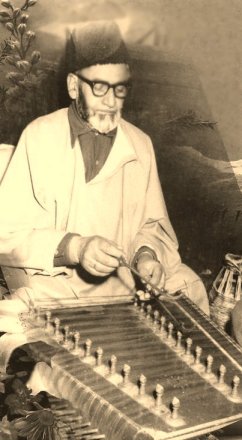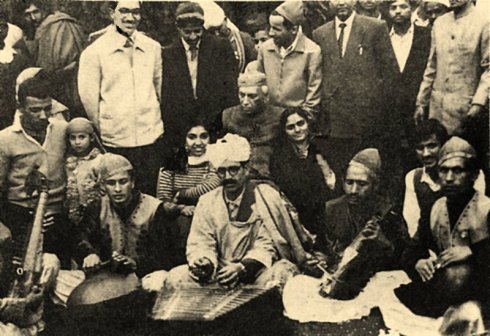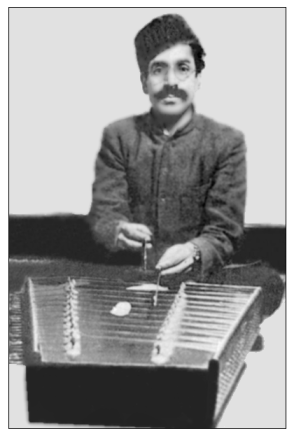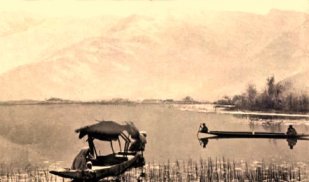Ustaad Tibetbaqal
00:00
00:00
Ustaad Muhammad Abdullah Tibetbaqal (July 14, 1914 – January 03, 1982 S/o Kh.Abdul
Gani Bota Wani) was a non Caste Sufiyana Vocalist and Instrumentalist
(Santoor etc) famously known as the “King of Santoor”. He was regarded
as one of the most successful Vocalist of North India and Central Asia.
In 1972, he was the First Person from J&K to whom Sangeet Natak
Academy Award was given by the President of India.
He was honored with Robe of Honour By Jammu and Kashmir Academy of
Art, Culture and Languages, Pride of Performance, Kala Kendra and Golden
Jubilee Award – All India Radio by the Ministry of Information and
Broadcasting, Government of India. He remained a leading Sufi singer and
instrumentalist (Santoor) of Kashmir at global level. In 1944, Taj
Company of Lahore recorded some Solo instrumental Santoor
recitals/wadans of Ustaad Tibetbaqal besides other recitations and
archived them for preservation.Ustaad Muhammad Abdullah Tibetbaqal was a master of unique, exceptional and a very tuneful voice. He improvised Sufiyana music to a great extent by introducing to it new techniques vocally as well as instrumentally. Though the Sufiyana music was traditionally sung in Persian language but the legendary Ustaad for the first time added Kashmiri Sufi poetry to it and this new experience got global appreciation especially from lovers of Kashmiri language.
Dr. Rajendra Prasad, Jawahar Lal Nehru, Indra Ghandhi, Shiekh Muhammad Abdullah, Mirwaiz Molvi Muhammad Farooq, Dr.Ali Jan, Dr.S.N.Dhar, Dr.G.Q.Alaqband, Dr.Hafizullah, Hakim Abdul Aziz of Jamia masjid, Hakim Ali Muhammad of Gojwara and other versatile personalities were the great grand fans of legendary Ustaad. It is important to mention here for information on the basis of revered and sound historical references duly authenticated at Govt. level, that Ustaad Muhammad Abdullah was the first who introduced Santoor at global level by performing Classical and Semi-Classical Vocal and Instrumental versions of Sufi Music. And got international invitations through Indian Council for Cultural Relations (ICCR) across the globe. His recordings are archived at government level in various countries like Germany, France, U.S.A, England, Iran, Iraq and Central Asian Countries.
Ustaad Sheikh Abdul Aziz, Amir ud din Zaz, Asad Gania, Muhammad Yusuf Mahaldar, Ustaad Muhammad Abdullah Sitari, Pt.Prithvi Nath Koul, Pt. Bhajan Sopori and Pt. Shiv Kumar Sharma are the disciples of Ustaad Muhammad Abdullah Tibetbaqal besides other top musicians. At University and College level when Music was introduced as one of the Subject in J&K State, Ustaad Muhammad Abdullah Tibetbaqal was nominated by the Govt. of Jammu and Kashmir to frame the Syllabi and necessary qualification required for Faculty of Music.
Besides being a Sufi musician, Ustaad Tibetbaqal was a Sufi poet, writer, spiritual, religious reformer and scholar. Thousands of people at Zoo Masjid, Zero bridge, Srinagar used to come from long distances for performing Salat ul Juma (Friday prayer) behind him and felt unique shower of mercy, bounties and spiritual satisfaction from Almighty Allah upon themselves.
Ustaad Muhammad Abdullah is the author of Spiritual Book titled Islam and Sama (Sufi Audition) in which he has beautifully explained and proved on the basis of Holy Quran, traditions of Holy Prophet (SAW), Islamic Jurisprudence that how Sama is permissible and forbidden in Islam.
‘One word at times may destroy the world; And one word at may (turn) the dead foxes into lions’ – H.Alama Moulana Rumi RA
In the year 1978, the University of Kashmir, Srinagar and Bonyad-e-Farhang-e-Iran, Tehran, felicitated Ustaad Muhammad Abdullah Tibetbaqal with the honor of being visiting faculty for second summer Institute for Persian teachers. Though it was a challenging experience for the legendary Ustaad to demonstrate practically i.e. on santoor (Commonly known as Phonology/Phonetics) the different aspects and etiquettes’ of Persian Language before the great teachers / intellectuals of that period but highly won appreciation from the seekers of knowledge.
Muhammad Ashraf Tibetbaqal is the only son of Ustaad Muhammad Abdullah Tibetbaqal who’s elder son Aadil Tibetbaqal (Astt.Prof. Faculty of Music & Fine Arts University of Kashmir Sgr) is now carrying the highly rich and inherited treasure of his grandfather to the upcoming lovers of Sufiyana Culture of Kashmir at Global level under the aim and mission of Tibetbaqal Memorial Trust, founded in 1983’ in the memory of Legendary Maestro Muhammad Abdullah Tibetbaqal.
The morning breeze scatters the rose; but not the log, which can only be spilt by an axe. The world subsists on music, exhilaration and ardour.But what can a blind man see in a mirror? (Alama Sheikh Sa’di)
(Coourtesy of Aadil Tibetbaqal-2013)
On January 6th 2013 Radio Kashmir Srinagar
organized a Sufiyana (classical) musical afternoon Sunday to pay tribute
to renowned Kashmiri Sufi singer Ustaad Muhammad Abdullah Tibetbaqaal
on his 31st death anniversary.
The program was attended by a galaxy of Kashmiri poets, writers and singers besides a large gathering of fans of Baqaal.Speakers on the occasion paid rich tributes and highlighted different aspects of Baqaal’s life and his contribution towards Sufiyana Music.
On the occasion Sufiyana music was also presented by different singers which mesmerized the audience and left them spell bound.
Among the 12 forms of classical (Sufiyana) music, when Ustaad Muhammad Abdullah Sitari sung Muqaami-i-Asawari on his Sitaar, the mesmerized audience murmured the words in resonance with the singer.
Muqam-i-Nawah by Sheikh Muhammad Yaqoob brought tears in the eyes of audience.
Chakker by Mohammad Abdullah Shakhsaaz, Naat by Muneer Ahmad Mir and Qawali by Mohammad Khalil Qawal enthralled the audience present on the occasion.
Speaking on the occasion Deputy Director General Radio Kashmir, Bashir Arif proposed to create a “Sufiyana Academy” to work for betterment of Sufiyana culture in the valley.
“Soul of our music is Sufiyana music, if it is gone, the soul of Kashmir will be injured,” he said. “We need to preserve and take it to next generation to make them understand it in real sense.”
Arif said Radio Kashmir is going to digitize the Sufi music of renowned singers to make it readily available in the market. “We are proud to have a vast archive and we will bring it to market in CD format very soon,” Arif said.
While welcoming the guests, writer Ghulam Nabi Khayal also called upon State Cultural Academy to form Sufiyana Academy. “Arrangements should be made to teach Persian language because most of the mystic poetry is in this language,” he said.
Terming Baqaal as a kind hearted and a lively person, noted poet and social activist Zareef Ahmad Zareef said, “Ustaad is so loved by people that he is remembered not in Valley but his music enthralls Sufi music lovers across the globe,” he said.
Zareef said there are people still in Europe who love to listen to Kashmiri Sufiana. ”He would continue to live in the hearts of people for times to come.”
The function was presided over by noted poet and Gyanpeeth awardee Prof Rehman Rahi. While paying tributes to Baqaal Rahi said, “Sufiyana music is a glorious gift of Kashmiri culture.”
Acknowledging the role of Deputy Director General RK (Bashir Arif) in preserving and popularizing Sufi music in Valley, TibetbaqaalMemorial Trust presented a Shawl to him by Mohammad Ashraf Tibetbaqaalwhile by Prof Rahi performed the Dastaar Bandhi.
Prominent among those present on the occasion are Dr Ghulam Qadir Alaqaband, Mushtaq Ahmad Latoo, Zafar Iqbal Manhas, Mohammad Sultan Pandit, Sharief-ud-din and Abdul Rehman Bhat.
Tibetbaqal (July 14, 1914–January 03, 1982) was a non-caste Sufiyana Vocalist and Instrumentalist (Santoor etc) famously known as the “King of Santoor”. He was regarded as one of the most successful Vocalist of North India and Central Asia. In 1972, he was the First Person from J&K to whom Sangeet Natak Academy Award was given by the President of India.
He was honored with Robe of Honour by State Cultural Academy, Pride of Performance, Kala Kendra and Golden Jubilee Award – All India Radio by the Ministry of Information and Broadcasting, Government of India. He remained a leading Sufi singer and instrumentalist (Santoor) of Kashmir at global level. In 1944, Taj Company of Lahore recorded some Solo instrumental Santoor recitals/wadans of Ustaad Tibetbaqal besides other recitations and archived them for preservation.
Tibetbaqal was a master of unique, exceptional and a very tuneful voice. He improvised Sufiyana music to a great extent by introducing to it new techniques vocally as well as instrumentally. Though the Sufiyana music was traditionally sung in Persian language but the legendary Ustaad for the first time added Kashmiri Sufi poetry to it and this new experience got global appreciation especially from lovers of Kashmiri language.
(Courtesy Sheikh Saleem 2013)
Muhammed Abdullah Tibetbaqal
S/O Khawaja Abdul Ghani
Resident of Ali Kadal, Srinagar, Kashmir
Born: 1914 Died: 1982
Resident of Ali Kadal, Srinagar, Kashmir
Born: 1914 Died: 1982
Tibetbaqal was in full employment with State run
Radio Kashmir. He was the master of a unique voice full of melody and
received appreciation from all the lovers of music having a special
relationship with Sufiana Kalaam. He did not belong to the family of
musicians but a family of businessmen dealing in world famous Pashmina
shawls and fruit like Apricot in particular.
Because of the business connections, his family was
influenced by getting in contact with people from Russia, Ladakh, Tibet,
and Yarqand. This Mongolian race from the regions of Ladakh, Tibet and
Yarqand was referred to as “Bota”. Since the poetry used in Sufiana
Kalaam is mainly Persian he had acquired fairly good knowledge of Arabic
and Persian which helped him to first understand what he was to sing.
Since his childhood, having a good voice, he was allowed to sing prayers
in Maktab (School) on regular basis which in turn proved to be helpful
for his future achievements. At a later stage because of his good voice
and his personal liking and attachment with Sufiana Kalaam he received
initial training in this from Ustad Ghani Joo and Ustad Ramzan Joo.
His family vehemently opposed his interest in singing
but he remained steadfast and adamant to continue receive the training
and stayed associated with the art. In 1948 Radio Kashmir had just been
introduced to Kashmirs and Tibetbaqal got this employment as a
breakthrough and was soon famous. His attempt to blend the Sufiana
Kalaam with local Kashmir dialect was a very good venture and was highly
acclaimed.
He continued to sing Naat and Manqabat (spiritual
singing) from Radio Kashmir while receiving appreciation from lovers of
this art especially his best capabilities to play this wonderful local
musical instrument called Santoor. He, at times, played other
instruments like Sitar, Harmonium and Tabla. He also worked with the
State department Cultural Academy and contributed to promote this art.
Though he received invitations to visit different countries but for some
reason he declined all these offers and preferred to stay in Kashmir.
*
*
*
The 1 st Music Album of Ustad Muhammad Abdullah Tibetbaqal
October 2009The new album titled ‘Anwari Muhammadi’ (SAW) featuring the Islamic devotional music of Kashmir in the voice of the Late Sufiana maestro Ustad Muhammad Abdullah Tibetbaqal was released by Minister for New and Renewable Energy Dr. Farooq Abdullah at new Delhi today.Minster of State for PWD Mr. Javed Ahmed Dar, Pandit Bhajan Sopori and Abhay Rustum Sopori were also present on the occasion.
It is for the first time in the history of music that the recording of the great legendery which is more than 50 to 60 years old has been put to music by the star composer and Santoor Maestro Abhay Rustum Sopori and conceptualized by Pandit Bhajan Sopori, the great Santoor legend & music composer. The album features a variety of devotional pieces like Naat, Manqabat, Salaam including the popular composition of Hazrat Maulana Jami (RA) “Ya Rassolay Hashmi” released under the banner of SaMaPa.
Speaking on the occasion Dr. Farooq Abdullah highly praised the musical quantum of the album which has been prepared to suit both the youth and the general public of the State. He congratulated both Pandit Bhajan Sopori and Abhay Rustum Sopori for their pioneering work in this production. He expressed need to have such albums more and more for the benefit of the music connoisseurs and art lovers.
Pandit Bhajan Sopori highlighted Abhay sopori’s scintillating and well designed music which has further elevated the richness of Ustad Tibetbaqal’s voice. Abhay, the music composer of the album, said that it was unfortunate that till now there was not even a single release in the market of Ustad Tibetbaqal and he felt the need to work in this direction to bring out the work of such legendary at International level. The album is available in the market at all major stores.
Mohammad Abdulla Tibetbakal was the most influential master of Kashmiri Sufiyana Music. Sufiyana Kalam is the classical music of Kashmir, which uses its own ragas(known as maqam), and is accompanied by a hundred-stringed instrument called the santoor,along with the Kashmiri saz, wasool, tabala and sitar.Sufiana Kalam has been popular in Kashmir since arriving from Iran in the 15th century and has been the music of choice for Kashmiri Sufi mystics.
Representing the rich musical heritage and cultural legacy of the state of jammu and kashmir, the enchanting Kashmiri Sufiyana Music adds to the glory and grandeur of the region
.
The beautiful Sufi music came to be known as the Kashmiri Sufiyana Music. An integral part of the rich cultural ancestry and religious legacy of the state of Jammu and Kashmir, Kashmiri Sufiyana music portrays the unlimited love of a devotee for the Supreme Being. Kashmiri Sufiyana Music boasts of an inherent divine element. Sung in praise of the Supreme Being, the enchanting melody of Kashmiri Sufiyana Music fills the devotees with an intense sense of devotion and dedication.
*





No comments:
Post a Comment